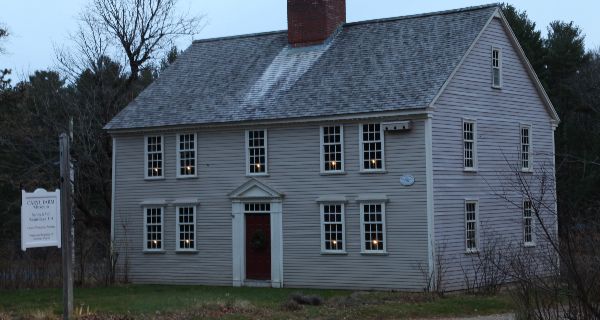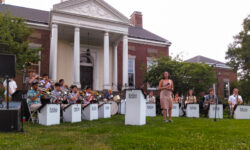By Elisha Lee
Hometown Weekly Contributor
The holiday season is once again upon us. It’s a warm and welcoming time and, as we drive past the Caryl House with its windows aglow, it is tempting to imagine the good Reverend ushering carolers into the living room and ladling punch before a blazing Yule Log.
In truth, however, it is unlikely that Benjamin Caryl would have recognized Christmas as a day apart from any other.
The Congregational Church to which Reverend Caryl belonged was the direct theological descendant of the early Puritans, for whom Christmas was an anathema. The holiday was considered inherently impure in that there was no scriptural evidence to indicate that Christ was actually born in December. It was generally acknowledged that the Roman Catholic Church had chosen the date some three centuries after the actual event, largely because of its coincidence with pagan celebrations of the winter solstice. Then too, the English holiday was rife with such manifestations of social disorder as wassailing, a custom in which revelers moved from house to house dispensing drink and frequently demanding payment in the form of food or yet more drink.
In 1659 the Massachusetts Bay Colony formally banned Christmas altogether, imposing a fine of five shillings upon all celebrants. The ban was lifted in 1681, but New England had little use for the holiday. In his Christmas Day sermon in 1712, the Reverend Cotton Mather asked his congregation: “can you in your conscience think that our Holy Savior is honored by mad mirth, by long eating, by hard drinking, by lewd gaming, by rude reveling? If you will yet go on and will do such things, I forewarn you that the burning wrath of God will break forth among you.”
By the time of Reverend Caryl’s ordination in 1762, there was clearly a desire amongst his fellow clergymen to be more in step with the rest of their faith, but their feelings about Christmas remained decidedly mixed. On December 25th, 1776, the Reverend Ezra Stiles, later President of Yale, noted in his diary “this day the nativity of our blessed Savior is celebrated through three quarters of Christendom … but the true date is unknown. On any day I can readily join with my fellow Christians in giving thanks to God for his unspeakable gift, and rejoice with them in the birth of a Savior. Tho' [if] it had been the will of Christ that the anniversary of his birth should have been celebrated, he would at least let us have known the day.”
In 1819 a 36-year-old New Yorker, Washington Irving, wrote of the traditional English Christmas and its associated customs in his collection of short stories titled "The Sketchbook of Geoffrey Crayon, Gent." Enormously popular on both sides of the Atlantic, Americans of all backgrounds warmed to such sentimental descriptions as “it brought the peasant and the peer together, and blended all ranks in one warm, generous flow of joy and kindness. The old halls of castles and manor-houses resounded with the harp and the Christmas carol, and their ample boards groaned under the weight of hospitality.”
Still, Americans were slow to embrace the notion of Christmas as a day on which work was not expected. The south embraced it more readily than the north, with Alabama declaring it an official holiday in 1836, followed by Louisiana and Arkansas in 1838. Massachusetts didn’t recognize December 25th as an official state holiday until 1856. Dover, slow even then to embrace change, wouldn’t observe Christmas until 1859. In his "History of Dover" (1897), local historian Frank Smith credited the observance and the first appearance of a Christmas tree to Reverend Edward Barker, who succeeded Reverend Ralph Sanger as minister of the Dover Church in 1858. An Englishman by birth, Barker was presumably more comfortable with the concept than his still-Calvinist congregation.
Apparently they took a dim view of it, as Dr. Barker was dismissed by vote of the congregation after only two years.
It would not be until 1870 that President Ulysses S. Grant declared Christmas a national holiday.




























